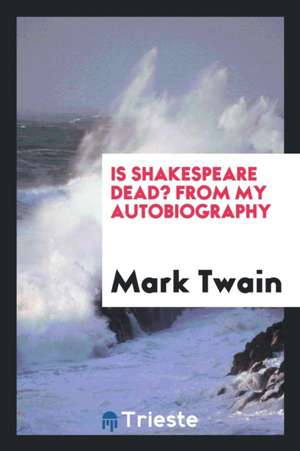Is Shakespeare Dead?: From My Autobiography
Autor Mark Twainen Limba Engleză Paperback – 16 mai 2018
| Toate formatele și edițiile | Preț | Express |
|---|---|---|
| Paperback (9) | 35.64 lei 3-5 săpt. | |
| – | 35.64 lei 3-5 săpt. | |
| CREATESPACE – | 53.38 lei 3-5 săpt. | |
| Alma Books COMMIS – 16 noi 2016 | 54.03 lei 3-5 săpt. | |
| – | 57.21 lei 3-5 săpt. | |
| Book Jungle – 3 noi 2009 | 64.77 lei 3-5 săpt. | +5.92 lei 7-13 zile |
| CREATESPACE – | 64.79 lei 3-5 săpt. | |
| – | 76.70 lei 3-5 săpt. | |
| CREATESPACE – | 80.92 lei 3-5 săpt. | |
| LIGHTNING SOURCE INC – 16 mai 2018 | 105.54 lei 18-23 zile | |
| Hardback (1) | 315.06 lei 3-5 săpt. | |
| Outlook Verlag – 4 apr 2018 | 315.06 lei 3-5 săpt. |
Preț: 105.54 lei
Nou
Puncte Express: 158
Preț estimativ în valută:
20.19€ • 21.04$ • 16.72£
20.19€ • 21.04$ • 16.72£
Comandă specială
Livrare economică 10-15 martie
Preluare comenzi: 021 569.72.76
Specificații
ISBN-13: 9780649487554
ISBN-10: 0649487559
Pagini: 168
Dimensiuni: 156 x 234 x 9 mm
Greutate: 0.25 kg
Editura: LIGHTNING SOURCE INC
ISBN-10: 0649487559
Pagini: 168
Dimensiuni: 156 x 234 x 9 mm
Greutate: 0.25 kg
Editura: LIGHTNING SOURCE INC
Caracteristici
Published to coincide with the 400th anniversary of Shakespeare's death
Notă biografică
Samuel Langhorne Clemens (1835 - 1910), better known by his pen name Mark Twain, was an American writer, humorist, entrepreneur, publisher and lecturer. Among his novels are The Adventures of Tom Sawyer (1876) and its sequel, Adventures of Huckleberry Finn (1885), the latter often called "The Great American Novel". Though Twain earned a great deal of money from his writings and lectures, he invested in ventures that lost a great deal of money, notably the Paige Compositor, a mechanical typesetter, which failed because of its complexity and imprecision. In the wake of these financial setbacks, he filed for protection from his creditors via bankruptcy, and with the help of Henry Huttleston Rogers eventually overcame his financial troubles. Twain chose to pay all his pre-bankruptcy creditors in full, though he had no legal responsibility to do so.
Recenzii
The father of American literature.










